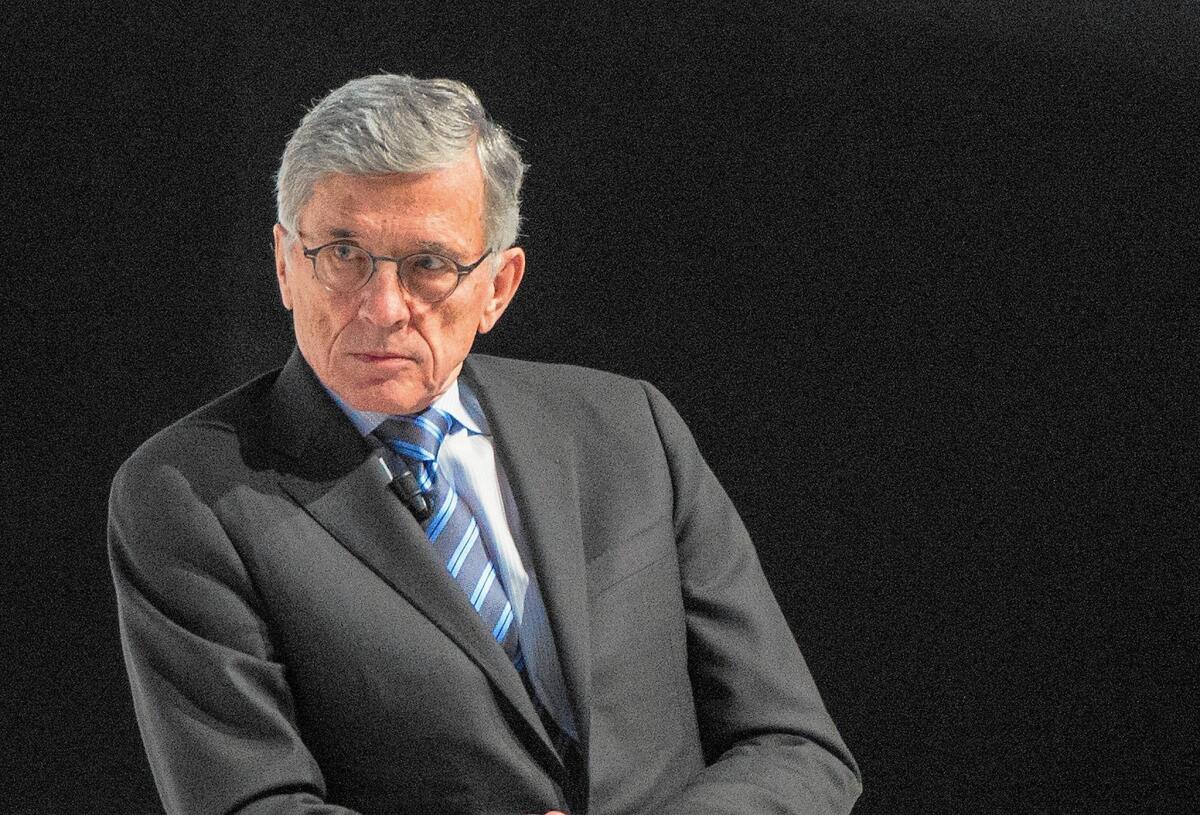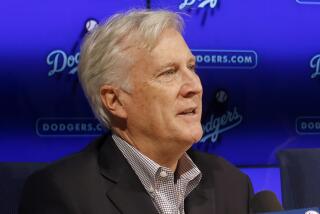FCC’s Tom Wheeler tells cable execs: ‘More competition would be better’

Reporting from CHICAGO — If the cable industry is looking for any breaks, it won’t have much luck with the Federal Communications Commission.
Tom Wheeler, the former cable-industry lobbyist turned FCC chairman, showed his teeth on Wednesday at the annual television industry convention in Chicago. He warned cable executives not to stifle competition, especially when it comes to Internet service, during a keynote speech that left many in the audience visibly squirming.
“Your challenge will be to overcome the temptation to use your predominant position in broadband to protect your traditional cable business,” Wheeler told the crowd. “The Internet will disrupt your existing business model. It does that to everyone.”
He urged: “More competition would be better.”
The timing of his address before the National Cable & Telecommunications Assn. comes at a crucial point for an industry trying to gauge how active regulators plan to be.
Just two weeks ago, the FCC and U.S. Department of Justice slapped down Comcast’s $45-billion takeover bid for Time Warner Cable. And still looming is AT&T’s $48-billion offer to buy DirecTV, a deal that would make the combined company America’s biggest pay-TV provider.
But that’s not all. Top cable executives on a panel after Wheeler’s speech seemed bullish about a wave of industry consolidation.
Time Warner Cable Chief Executive Robert Marcus and Charter Communications Chief Executive Thomas Rutledge were under the spotlight during a panel of top brass from five cable companies. There has been intense speculation that the two companies are currently in deal talks.
Asked if the two CEOs had anything to announce, Rutledge said, “The world is full of possibilities.”
Not to be outdone, Cablevision Chief Executive James Dolan said during the panel that he was ready to do a deal — with Time Warner Cable. Why not bring together the two largest pay-TV providers that serve New York, he asked.
The other CEOs appeared stunned, as did the crowd. Shares of Cablevision surged 6% right after Dolan made the comment.
But the question now is whether Wheeler and other regulators will put up roadblocks. Wall Street analysts who attended this week’s convention sounded alarms about increasing intervention from Washington.
Craig Moffett, a longtime cable analyst, said he was “more bearish than most” about increased involvement from regulators.
“Cable is best positioned to win the broadband wars,” Moffett said during an earlier panel discussion, referring to the higher cable Internet speeds compared with what telecommunications companies like Verizon and AT&T offer.
However, he said the “real question” is whether the government will allow cable companies a long enough leash to raise prices and collect the spoils.
The tense atmosphere also comes as the industry is gearing up to challenge the FCC’s new Open Internet order, which puts more scrutiny on cable providers and the prices they charge.
The government is trying to prevent a two-tiered pricing system in which customers pay more for higher broadband speeds. The new regulations demand that companies, such as Time Warner Cable, AT&T and Comcast Corp., treat Internet traffic equally.
The new rules, adopted earlier this year by a divided FCC, come after decades of the federal government allowing the companies to operate in a less restrictive environment. Cable and wireless industry trade groups are challenging in court the FCC’s regulations, also known as net neutrality rules.
And cable executives voiced their support of a lighter regulatory touch when they addressed Wheeler during a question and answer session after his speech.
“I am baffled by the chairman’s remarks,” said Michael Fries, president and chief executive of European cable group Liberty Global, which doesn’t have any television business in the U.S. “There is a presumption of guilt and punishment for success that I’ve never seen before.”
Fries’ remarks prompted applause and cheers from the crowd.
The cable chiefs said they face plenty of competition.
Rutledge, the Charter CEO, remarked that “we, in the U.S., suffer from Stockholm syndrome, and we have to be careful about what we think of our captors,” meaning the FCC.
Wheeler didn’t apologize, nor did he back down.
He made it clear that two government agencies had separately concluded that a union of the nation’s two largest cable TV companies was not in the public interest. Comcast would have become a formidable gatekeeper if it controlled the so-called “last mile” of Internet connections in the nation’s largest cities.
The government’s scrutiny of the merger came at a “tipping point” in the industry. Last summer, the number of homes with high-speed Internet subscriptions surpassed the number of households that pay for TV channels, Wheeler said.
“We recognized that the industry had changed and we saw concrete evidence of the new competition and business models made possible by high-speed Internet access,” Wheeler said. “We recognized that broadband had to be at the center of our analysis, and that video was, in essence, an application that flows over networks.”
Wheeler also prodded the industry to continue to invest in upgrading networks so that more Americans can enjoy higher-speed service that is required for many uses, including streaming video. The industry collectively spent $60 billion on upgrades to the cable and Internet networks last year.
Right after Wheeler’s remarks, the trade group NCTA released a statement saying it appreciated that the FCC chairman used the show to talk about the importance of net neutrality.
“Cable is the largest broadband industry in America, and our networks are ushering in an exciting transformation of how consumers are enjoying content and experiencing new entertainment services,” the group said.
In an awkward twist, Wheeler served as president of the NCTA back in the early 1980s. But his transition from industry lobbyist to watchdog has rubbed many in the cable industry the wrong way.
Pat Esser, president of Cox Communications, which serves Orange and San Diego counties, just shook his head.
“I feel like we created this American dream and somewhere we got out of sync with the regulators,” Esser said. “We have to get back ... [to working] together.”
More to Read
From the Oscars to the Emmys.
Get the Envelope newsletter for exclusive awards season coverage, behind-the-scenes stories from the Envelope podcast and columnist Glenn Whipp’s must-read analysis.
You may occasionally receive promotional content from the Los Angeles Times.







